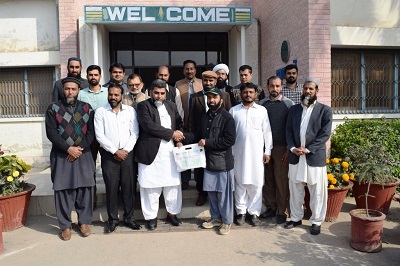
Maize is Pakistan’s third important cereal following wheat and rice. Pakistan’s maize yield is among the highest in South Asia with an average yield of 4.5 tons per hectare (t/ha). Maize production in Pakistan in 2016-17 set a record high of 6.1 million tons, a 16 percent increase from the previous year and almost a 600 percent increase from levels in the early 1980s. The introduction and rapid expansion of hybrid maize in the mid 1990s, particularly in the spring season, is among the drivers for the wider adoption of maize in Pakistan.
Despite the noteworthy progress of maize production and productivity, Pakistan still imports more than 80 percent of the hybrid seeds, costing the country over $50 million annually and making retail price of hybrid seeds expensive. Dependency on seed import will not warrant sustainable maize production.
The International Maize and Wheat Improvement Center (CIMMYT)–led and United States Agency for International Development (USAID)-funded Agricultural Innovation Program (AIP) for Pakistan is supporting national partners to revitalize maize research and product development initiatives. AIP achieved introduced CIMMYT’s superior second-generation tropically adapted haploid inducers (CIM2GTAILs) for the first time in the history of Pakistan.
Haploid inducers are a specially developed maize genetic stock that are used to develop doubled haploid (DH) maize lines. DH maize lines are highly uniform, genetically pure and stable, making the maize breeding process more intuitive and efficient by simplifying logistics.
This material was shared with two AIP public partners, Maize and Millets Research Institute (MMRI) and University of Agriculture Faisalabad (UAF). The CIM2GTAILs showed high haploid induction rates (~8-15 percent) under CIMMYT-tested (sub)tropical conditions in Mexico and Kenya, and showed better agronomic performance in terms of plant vigor, synchrony with tropical source populations, better standability, and resistance to important tropical foliar diseases and ear rots..
This DH technology is capable to develop a large number of inbred lines with highest uniformity and homozygosity in shortest possible time of 2-3 generations. Conventional breeding methods needs 6-8 generations to develop stable maize inbred line.

While handing over the inducer seeds to UAF, Muhammad Imtiaz, CIMMYT country representative for Pakistan said “the initiation of the DH technology in Pakistan will modernize and enhance maize breeding efficiency of local institutions particularly in availing locally adapted inbred lines.”
The two institutions have mobilized additional resources from the Government of Pakistan to establish the required DH facilities in their respective institutions and currently they are multiplying the seeds in a controlled environment. Receiving the seeds that were sent from CIMMYT Mexico, Muhammad Aslam, assistant professor at UAF and Muhammad Arshad, director of MMRI sincerely acknowledged the continued and unreserved support from CIMMYT particularly in building the capacity of national programs.
CIMMYT and AIP have trained Pakistani researchers on DH technology in Mexico and Kenya and have allocated 52 market-ready maize varities, including hybrids and biofortified varieties, to 12 public and private partners to foster availability and affordability of maize seeds in Pakistan.
The Agricultural Innovation Program (AIP) for Pakistan is working to sustainably increase agricultural productivity and incomes in the agricultural sector through the promotion and dissemination of modern technologies/practices in the livestock, horticulture (fruits and vegetables) and cereals (wheat, maize and rice) sector. Project management is vested in a unique consortium of CGIAR Centers and the Pakistan Agricultural Research Council (PARC), led by CIMMYT supported by the U.S. Agency for International Development. The project aims to foster emergence of a dynamic, responsive, and competitive system of science and innovation in Pakistan. AIP seeks to catalyze equitable growth in agricultural production, productivity, and value.


